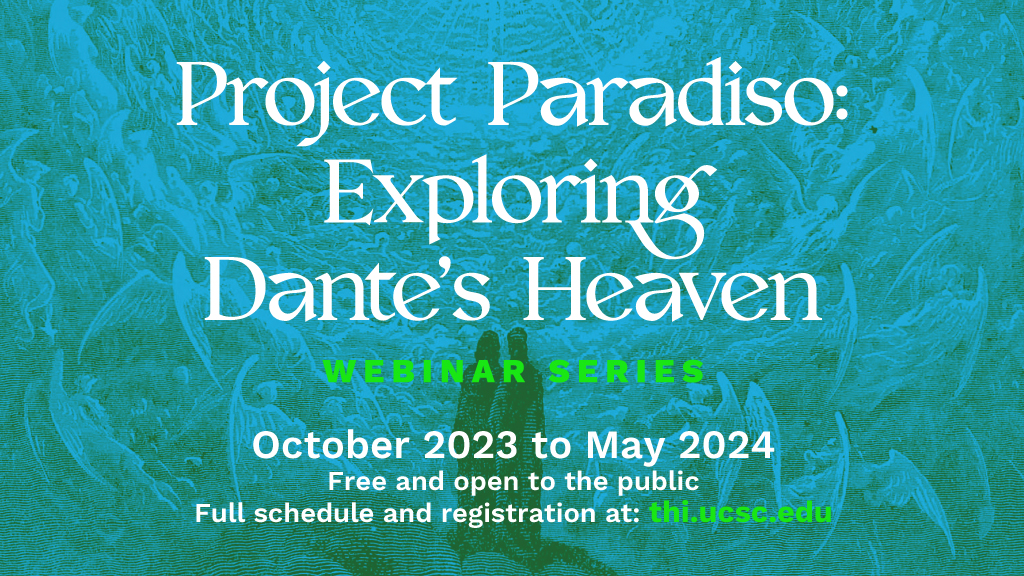Events

- This event has passed.
Cancelled – Project Paradiso: A Gateway to Dante’s Heaven – Episode Eight – Hierarchy and Diversity (Paradiso 3; 27–29 & 32)
February 9 @ 9:00 am - 10:30 am | Virtual Event
Share
Dante’s Paradiso is the least studied and the least understood of the three parts of the Commedia. Yet it is arguably the most important for the dynamism and originality of the literary, theological, and philosophical inquiries that take place there. It is also a singularly important interpretive guide for a full understanding of the entire Commedia. It is a poem that asks to be tackled by a community of engaged readers: here it’s your opportunity! This year-long series of webinar workshops led by world-renowned scholars will take you on a deep reading of the Paradiso and an unforgettable journey to the heart of Dante’s universe. This virtual series will reward both first-time and expert readers of the Commedia with an opportunity to delve deep into one of the most complex and daring speculative poems ever written. We’ll be meeting online almost every other week from October to May. See the Project Paradiso page for full schedule.
 Paola Nasti is Associate Professor of Italian Literature at Northwestern University. She has also taught, as an associate, in the United Kingdom. Her research focuses on Dante’s biblical, religious and theological culture. In addition to a monograph on the Solomonic tradition (Favole d’amore e “saver profondo”: la tradizione salomonica in Dante. Angelo Longo Editore, Ravenna 2007) she has published numerous essays on the scriptural theme: ‘Vocabuli d’autori e di Scienze e di libri ‘(Conv. II xii 5): Dante’s wisdom paths’, in Ledda, G. (ed.) Dante’s Bible: Mystical experience, prophecy and biblical theology in Dante. Centro Dantesco Onlus, Ravenna, 2011); ‘Dante and ecclesiology’, in: Hoeness, C. E. and Treherne, M. (eds.) Reviewing Dante’s Theology, Peter Lang,2013)’; ‘The stigmata and the love of the poor man of Assisi: Dante’s reinterpretations of a medieval topos’, in Christian Dante and religious culture in medieval Italy, Ravenna, Longo, 2018); ‘The triumph of Christ: anti-pietism in Comedy’, in Proceedings of the Conference “Theologus Dantes. Theological themes in the works and in the first commentaries”, Venice, Edizioni Ca’ Foscari, 2018, pp. 103-138).; ‘Religious Culture’, in Cambridge Companion to Dante’s Commedia, ed. by Z. G. Baranski and S. Gilson, Cambridge, Cambridge University Press, 2018, pp. 158-172.in Proceedings of the Conference “Theologus Dantes. Theological themes in the works and in the first commentaries”, Venice, Edizioni Ca’ Foscari, 2018, pp. 103-138).; ‘Religious Culture’, in Cambridge Companion to Dante’s Commedia, ed. by Z. G. Baranski and S. Gilson, Cambridge, Cambridge University Press, 2018, pp. 158-172.in Proceedings of the Conference “Theologus Dantes. Theological themes in the works and in the first commentaries”, Venice, Edizioni Ca’ Foscari, 2018, pp. 103-138).; ‘Religious Culture’, in Cambridge Companion to Dante’s Commedia, ed. by Z. G. Baranski and S. Gilson, Cambridge, Cambridge University Press, 2018, pp. 158-172.
Paola Nasti is Associate Professor of Italian Literature at Northwestern University. She has also taught, as an associate, in the United Kingdom. Her research focuses on Dante’s biblical, religious and theological culture. In addition to a monograph on the Solomonic tradition (Favole d’amore e “saver profondo”: la tradizione salomonica in Dante. Angelo Longo Editore, Ravenna 2007) she has published numerous essays on the scriptural theme: ‘Vocabuli d’autori e di Scienze e di libri ‘(Conv. II xii 5): Dante’s wisdom paths’, in Ledda, G. (ed.) Dante’s Bible: Mystical experience, prophecy and biblical theology in Dante. Centro Dantesco Onlus, Ravenna, 2011); ‘Dante and ecclesiology’, in: Hoeness, C. E. and Treherne, M. (eds.) Reviewing Dante’s Theology, Peter Lang,2013)’; ‘The stigmata and the love of the poor man of Assisi: Dante’s reinterpretations of a medieval topos’, in Christian Dante and religious culture in medieval Italy, Ravenna, Longo, 2018); ‘The triumph of Christ: anti-pietism in Comedy’, in Proceedings of the Conference “Theologus Dantes. Theological themes in the works and in the first commentaries”, Venice, Edizioni Ca’ Foscari, 2018, pp. 103-138).; ‘Religious Culture’, in Cambridge Companion to Dante’s Commedia, ed. by Z. G. Baranski and S. Gilson, Cambridge, Cambridge University Press, 2018, pp. 158-172.in Proceedings of the Conference “Theologus Dantes. Theological themes in the works and in the first commentaries”, Venice, Edizioni Ca’ Foscari, 2018, pp. 103-138).; ‘Religious Culture’, in Cambridge Companion to Dante’s Commedia, ed. by Z. G. Baranski and S. Gilson, Cambridge, Cambridge University Press, 2018, pp. 158-172.in Proceedings of the Conference “Theologus Dantes. Theological themes in the works and in the first commentaries”, Venice, Edizioni Ca’ Foscari, 2018, pp. 103-138).; ‘Religious Culture’, in Cambridge Companion to Dante’s Commedia, ed. by Z. G. Baranski and S. Gilson, Cambridge, Cambridge University Press, 2018, pp. 158-172.
Presented by the Humanities Institute and the Department of Literature Italian Studies. Sponsored by the University of California Humanities Research Institute, Siegfried and Elizabeth Mignon Puknat Literary Studies Endowment, and Porter College

